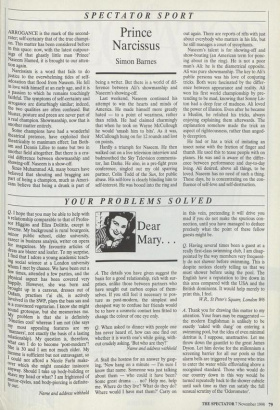YOUR PROBLEMS SOLVED
Q. I hope that you may be able to help with a relationship comparable to that of Profes- sor Higgins and Eliza Dolittle, except in reverse. My background is rural bourgeois, minor public school, older university, career in business analysis, writer on opera for magazines. My favourite articles of dress are blazer and loafer. To my surprise, I find that I adore a young academic teach- ing social science at a London university Whom I met by chance. We have been out a few times, attended a few parties, and the Physical aspect has been covered very haPPily. However, she was born and brought up in a caravan, dresses out of Nam, practises t'ai chi, is actively involved in the SWP, plays the bass sax and is a convinced vegetarian. I know she might sMInd grotesque, but she mesmerises me. !qY problem is that she is definitely Nineties cool' whereas I am not (she says Y most appealing features are my Manners', not exactly the basis of a lasting relationship). My question is, therefore, What can I do to become 'post-modern'? S, he is 30 and I am not much older. My Income is sufficient but not extravagant, so I could not afford a Nicole Farhi make- over which she might consider insincere aLnYvvaY. Should I take up body-building or suave my head or what? I am frightened of motor-cycles, and body-piercing is definite- Name and address withheld
Dear Mary. . .
A. The details you have given suggest the basis for a good relationship, rich with sur- prises, unlike those between partners who have sought out carbon copies of them- selves. If you still feel it necessary to pos- ture as post-modern, the simplest and cheapest way to confuse her friends would be to have a cosmetic contact lens fitted to change the colour of one eye only.
Q. When asked to dinner with people one has never heard of, how can one find out whether it is worth one's while going, with- out crudely asking, 'But who are they?' Name and address withheld A. Stall the hostess for an answer by gasp- ing, 'Now hang on a minute — I'm sure I know that name. Someone was just talking about them — who could it have been? Some great drama . . . no? Help me, help me. Where do they live? What do they do? Where would I have met them?' Carry on
in this vein, pretending it will drive you mad if you do not make the spurious con- nection, until you have managed to deduce precisely what the point of these fellow guests might be.
Q. Having several times been a guest at a really first-class swimming club, I am disap- pointed by the way members very frequent- ly do not shower before swimming. This is despite notices clearly telling us that we must shower before using the pool. The English have a reputation to live down in this area compared with the USA and the British dominions. It would help merely to print this, I feel.
W.R., St Peter's Square, London W6 A. Thank you for drawing this matter to my attention. Your fears may be exaggerated — the modern Englishman is unlikely to be exactly 'caked with dung' on entering a swimming pool, but the idea of even minimal detritus is, I suppose, unattractive. Let me throw down the gauntlet to the great James Dyson. Let him devise for the millennium a screening barrier for all our pools so that alarm bells are triggered by anyone who tries to enter the water while effluviating above a recognised standard. Those who would do our country down in this way would be turned repeatedly back to the shower cubicle until such time as they can satisfy the full sensual scrutiny of the `Odorometer'.


















































































 Previous page
Previous page